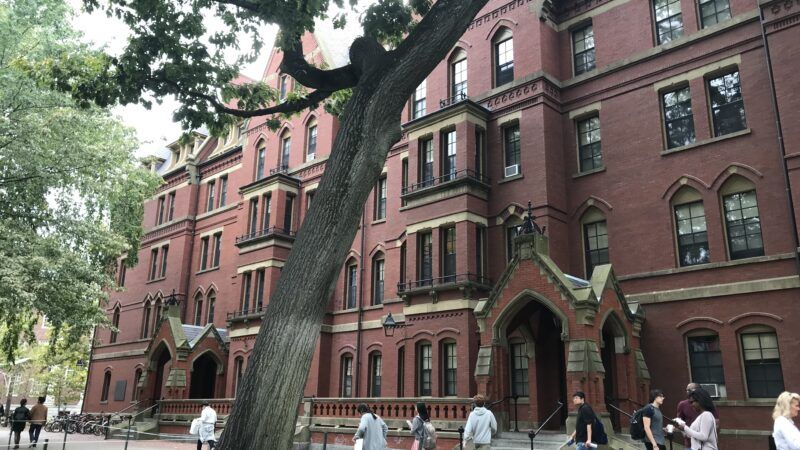Title IX's 50th Anniversary Is a Dark Day for Due Process on Campus
The Biden administration just proposed new rules that would undermine basic fairness in college sexual misconduct disputes.

It's been nearly a decade since Damilare Sonoiki graduated from Harvard University, but the institution still has yet to award him a degree.
That's because Sonoiki, a native of Nigeria who immigrated to the U.S. at age 6, was accused of sexual misconduct by two women just days before the graduation ceremony in May 2013. Sonoiki served as president of the university's Black Men's Forum, received the Association of Black Harvard Women's Annual Senior Award, and gave a speech at the festivities prior to commencement.
Sonoiki had separate sexual encounters with the two women: He maintains that they were consensual. Initially, the second accuser did not wish to bring a formal complaint, but Sarah Rankin, director of the Office of Sexual Assault Prevention and Response, persuaded her to do so.
In the course of investigating and then adjudicating the allegations, Harvard breached its contract with Sonoiki while violating basic principles of due process in numerous ways, the ex-student argued in his 2019 lawsuit. That suit was dismissed in 2020. But last week, a full 16 months later, the 1st Circuit Court of Appeals partly reversed the dismissal, asserting that Sonoiki plausibly alleged procedural wrongdoing.
"We are pleased with the result," Sonoiki's attorneys told Reason.
The case will now return to the lower court, where Sonoiki will continue his efforts to hold Harvard accountable for denying him the opportunity to argue his innocence. In his lawsuit, Sonoiki maintains the sexual encounters were consensual, and that they only became formally disputed issues because Harvard's administrators pushed the women to make accusations. This escalation, in other words, arguably resulted from Harvard's fealty to Title IX, the federal statute that prohibits sex-based discrimination in education. Title IX became law 50 years ago today.
The original purpose of Title IX was to ensure that women had equal access to educational opportunities and extracurricular activities, like clubs and sports. How well it accomplished that is a matter of debate; Reason's Natalie Dowzicky writes that "Title IX did remove barriers for women and girls to participate in sports, but the implementation has been flawed, with worse outcomes than anticipated."
In the last 15 years, the enforcement of Title IX with respect to due process on college campuses has been a disaster. The Obama administration's Education Department interpreted the statute as requiring university administrators to treat sexual misconduct and harassment as forms of sex-based discrimination, and investigate all accusations with a zealousness that often sacrificed principles of basic fairness. Under Catherine Lhamon, the Obama administration's Title IX enforcer, colleges increasingly moved to a single-investigator model, in which one administrator would investigate a claim, determine which witnesses to interview, and produce a report asserting guilt or innocence. Accused students were routinely denied access to legal counsel, awareness of the charges against them, and the ability to cross-examine accusers.
In Sonoiki's case, for instance, he expected—based on the rules outlined in Harvard's student handbook—that the administrator serving as his representative would keep their communications private, like a defense attorney. This was not the case.
In its decision upholding Sonoiki's breach of contract claim, the court found that "the contractual terms as described above clearly and strongly encouraged Sonoiki to trust his Board Rep and therefore Sonoiki could reasonably expect that some level of confidentiality flowed from such a trust relationship."
Sonoiki is just one of hundreds of students who were sanctioned by an educational institution attempting to comply with the Obama administration's interpretation of Title IX. These sanctions were frequently challenged in court, and many such students have ultimately prevailed due to the underlying unfairness and quasi-legality of the proceedings. For many, however, relief comes far too late to resuscitate their college careers.
"Title IX is supposed to ensure fairness for both parties in a campus sexual assault adjudication, and not solely the accuser," says KC Johnson, a history professor at Brooklyn College and expert on campus sexual misconduct adjudication. "Unfortunately, however, as applied, Title IX too often has been used as a sword to erode principles of due process and prevent wrongly accused students from having a meaningful chance to defend themselves."
Under former President Donald Trump, Education Secretary Betsy DeVos revised the government's Title IX guidance in order to create protocols that were fairer to both accusers and the accused. DeVos' reforms, which underwent formal rule-making procedures, give accused students the right to consult legal counsel, and have legal counsel scrutinize the narrative of the accused. The rules also allow for nonadversarial, restorative justice options in cases where both parties prefer this option.
President Joe Biden, however, has vowed to undo DeVos' reforms. Today, on the 50th anniversary of Title IX, he has taken the first steps toward doing so. Education Secretary Miguel Cardona has proposed a series of revisions to the Education Department's Title IX approach that would gut the due process protections embedded in the DeVos model. Cardona's proposed regulations would once again permit adjudication via a single-investigator model, denying accused students the right to challenge their accusers. Schools would no longer need to hold hearings for accused students at all; they would instead be interrogated during "individual meetings," in which they might not fully understand the nature of the accusation.
Fifty years after Title IX became the law of the land, the statute is being used not to expand educational opportunities, but to narrow them—for students, like Sonoiki, who were accused of sexual misconduct and then subjected to a blatantly unfair adjudication process. And the progress made in the last few years toward reestablishing fair, justice-based hearings on campuses could now be undone by this administration.


Show Comments (18)